Applications open to join the 2023 Voices to End FGM/C hybrid digital storytelling workshop cohort!
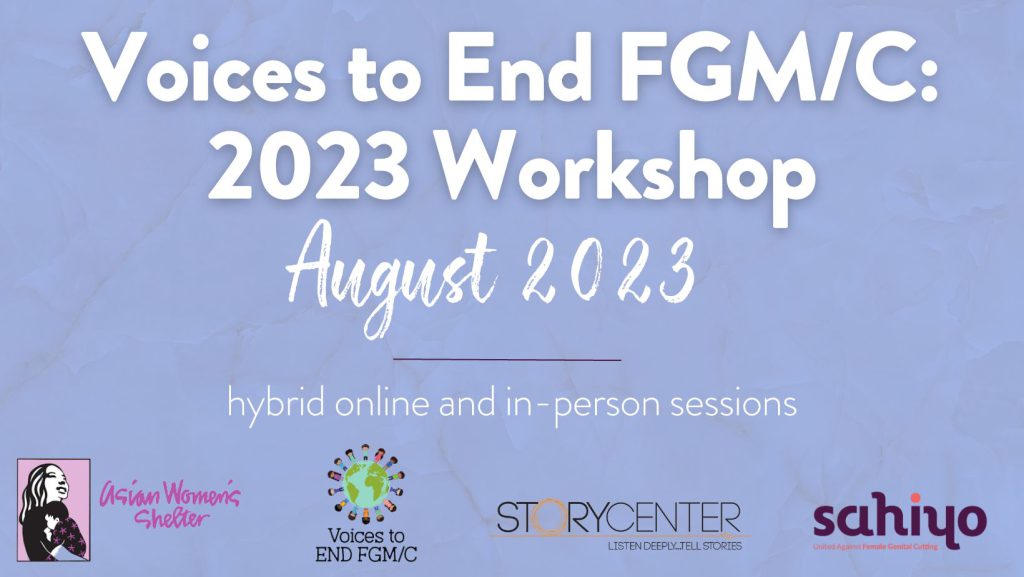
Sahiyo U.S., StoryCenter, and Asian Women’s Shelter would like to announce that recruitment is open for our 2023 Voices to End FGM/C hybrid digital storytelling workshop. Since 2015, Sahiyo has provided various storytelling platforms for survivors and community members around the world to share their experiences of female genital cutting (FGC); in particular, Voices to End FGM/C, a digital storytelling project, brings individuals impacted by FGM/C together in order to heal, build community with one another, and create digital stories that can be used to support surivors and educate and prevent future generations form undergoing this harm. More about the workshop: When: The virtual sessions will take place on Tuesday, August 14th and Tuesday, August 22nd, 2023, from 4-6 pm Pacific / 7-9 pm Eastern (U.S. time). In order to be confirmed, applicants must be able to attend all workshop sessions, both virtual and in-person. The in-person sessions will take place on August 26th and 27th, 2023, from 9 am to 5 pm PT in Oakland, CA. Please note that the travel days to and from the workshop will be on August 25th and 28th, 2023. Who: The workshop is open to those based in the U.S. who have experienced FGM/C, as well as family members, friends, advocates, and others who would like to share a story about why it needs to end. What: Each participant will learn to create their own simple video through the use of voiceover audio, still images, and video clips. This participatory media process will be guided by facilitators from Sahiyo, StoryCenter, and Asian Women’s Shelter. [youtube url=”https://www.youtube.com/watch?v=705aESUouik”] Following the workshop, Sahiyo will support storytellers in publicly sharing their videos as part of our ongoing education and advocacy work to end FGM/C. If you’re interested in taking part, please fill out the application by Friday, July 15, 2023. If you would like more information on this revolutionary storytelling experience, please email Mariya at mariya@sahiyo.org. To view digital stories from previous Voices to End FGM/C workshops, click here.
Washington State becomes 41st state to pass law against FGM/C
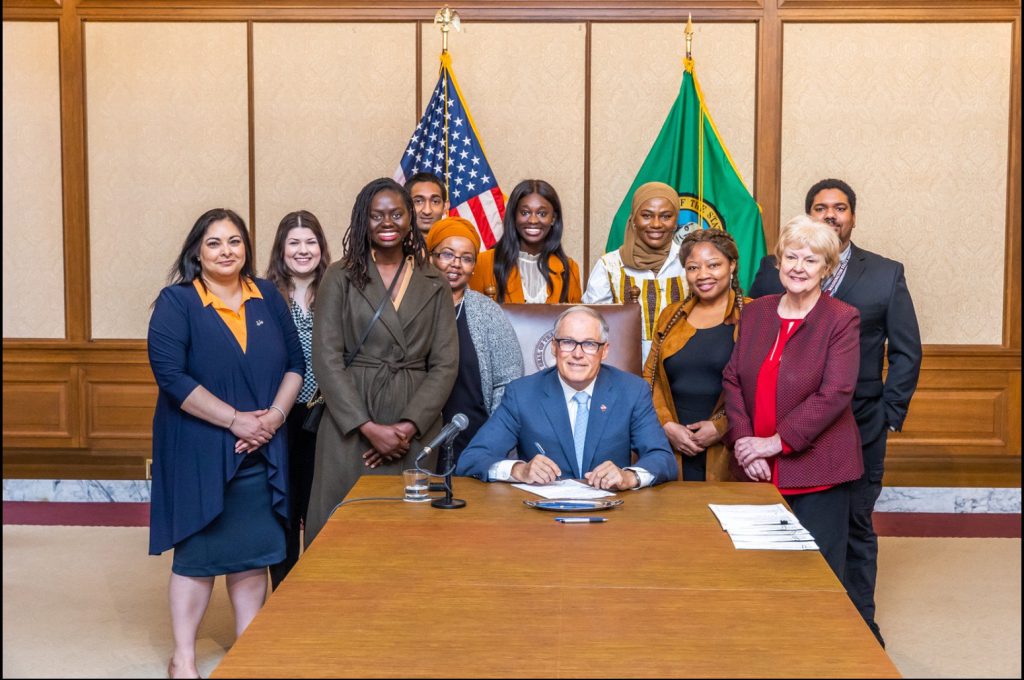
Sahiyo, as part of the Washington Coalition to End FGM/C, is ecstatic to announce that on April 20th, 2023, Washington state Governor Jay Inslee signed Senate Bill 5453 concerning female genital mutilation/cutting (FGM/C) into law. This law creates a private right of action for survivors of FGM/C; prohibits providers from performing FGM/C on a minor; establishes education and outreach initiatives to prevent FGM/C; and provides care for victims and families of FGM/C. Many thanks and congratulations to all who were involved in this legislative process! Below are reactions to the bill’s passage by members of Washington Coalition to End FGM/C. This survivor- and community-led coalition was instrumental in advocating for and gathering support to make this law a reality. “SB 5354 passing is a victory and an emotional moment on so many levels. The power of the collective work and collaboration of the coalition members and affected communities is a living example of the power of community engagement/involvement. The representation and story shared is so real and compelling. The coalition work is not yet over, the coalition work model should be replicated to propose similar bills in the remaining nine states. More importantly, the bulk of the work starts after SB 5354 was signed by the Governor. The goal is to make sure appropriate pathways, educational programs, and materials developed to meet these communities’ needs are culturally sensitive and will maintain families well beings, as well as promote healing; and the community should have access (parents, children, and professionals). I am so proud to be a part of this great coalition.” ~Dr. Muna Osman “Passing this bill is long overdue, and I feel proud to see Washington state join the 40 other states that have acted to end this practice. The collaborative work of our coalition that led to the passing of SB 5453 in Washington can serve as a model for the 9 other states that have yet to act against female genital cutting. This law presents an opportunity for a much-needed conversation and education on FGC in our communities and is a critical step towards advancing gender equity and human rights while safeguarding future generations of girls and women from this harmful practice.” ~Absa Samba “It’s absolutely amazing to see that Washington has become the 41st state to pass a law to protect children from female genital mutilation/cutting. Over the past 10 years, I’ve been fortunate to be part of survivor-led coalitions in Massachusetts and Connecticut that have sought to create change when it comes to ending this harmful practice. I am amazed by just how quickly we were able to form a survivor-led coalition in Washington, and I am forever grateful that our bill sponsor, Senator Keiser understood the importance of ensuring that the language of this bill was based on feedback from FGC-impacted communities themselves.” ~Mariya Taher, Executive Director, Sahiyo U.S. “The only way the United States can effectively advance gender equality is if we lead by example. And that starts, here at home. Five years ago, I started a petition to push Washington state to ban FGM, mobilizing over 170,000 supporters along the way. I’m grateful for Absa Samba, a bright light and young leader who convened survivors from diverse backgrounds, to craft legislation that balances prosecution and prevention in a way that can serve as a model for not just Washington state, but the world. The passing of this bill illustrates how survivor-fueled advocacy can lead to sustainable social change.” ~Maryum Saifee “I joined Absa Samba as she created a coalition of diverse Washington State women who live in communities affected by FGM, were bravely willing to share their personal experience with FGM, and share a commitment to curbing this practice through the passage of SB 5453. As a professor of anthropology with decades of experience studying strategies to end FGM, I offered testimony on the proven importance of legislation as a tool for change, particularly when it funds outreach and education. When families and community members deliberate upon whether a girls should undergo FGM, knowledge of the law strengthens the power of persuasion of those who no longer endorse the practice. As such, the law will strengthen efforts to prevent girls in Washington State from being subjected to the practice of FGM.” ~Bettina Shell-Duncan “The U.S. End FGM/C Network is thrilled to see the passing of SB5453, making Washington State the 41st state in the U.S. to take a stand against FGM/C. This new law sets a precedent for the remaining 9 states to pass comprehensive, holistic laws to protect women and children across this country. We also know that this is only the first step and we look forward to working with the WA Department of Health, the WA Coalition to End FGM/C, impacted communities, and other stakeholders to ensure that this law is implemented to its fullest potential.” ~Caitlin LeMay, Executive Director, The U.S. End FGM/C Network “Children’s Alliance is honored to have had the opportunity to work alongside an incredible team of FGM/C survivors and advocates to pass this critically important legislation. Washington state was a laggard in providing protections against this practice; our state’s children and youth will greatly benefit from the work of this coalition.” ~Dr. Stephan Blanford, Executive Director, Children’s Alliance “It saddens me that it is 2023, and young girls are still at risk of facing FGM/C or have already experienced such a traumatic incident. It is heartbreaking and needs to come to an end. This bill is one step closer to making young girls feel safe in Washington. This bill is hope, hope that young girls in Washington will not experience such a violent act. Now, it’s time to work on an effective implementation that will change their lives.” ~Mother Africa “We applaud Washington lawmakers for taking this critical step in the fight to eradicate the practice of FGM in the United States, and call on the remaining nine states to take similar action. FGM is
FGC in the United States: How Americans can help end this practice
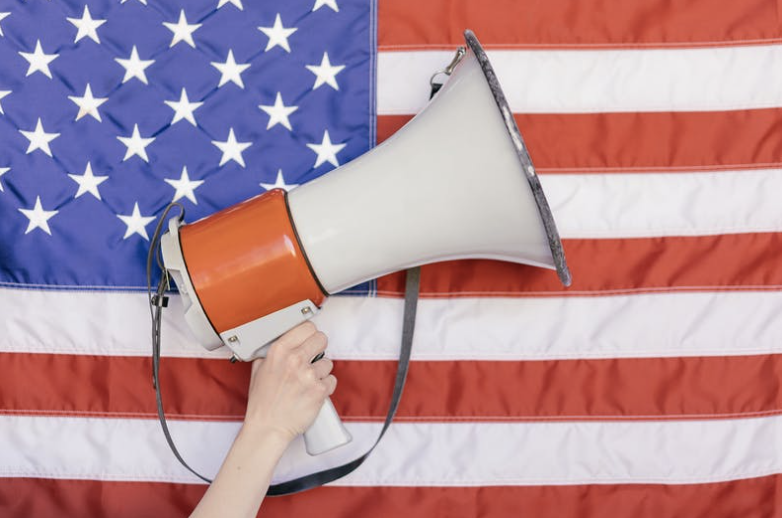
By Katie Geren Female genital cutting (FGC) is a global issue. It happens in many countries, including the United States, though that is not often common knowledge here. I learned about FGC for the first time in one of my college communication classes, and was surprised I had never heard of the practice before. I wanted to help those affected by it, but I felt unsure if I could have an impact on this issue. I was just one person, how could I help? I felt a heavy weight that day. When I found Sahiyo, I knew that ending FGC was important work that I wanted to contribute to. The community helped me realize that while I am just one person, there is a lot I can do to support other women. I felt determined to advocate for survivor’s rights. Yet, I was doubtful about my ability to cope with learning more about FGC. Once I started my internship with the Social Media team, I found the opposite to be true. I was empowered and inspired by the women at Sahiyo who had the courage to share their stories and uplift others. I think it is understandable that people have reservations about this topic; it can be uncomfortable. Even Americans who have heard about FGC may be unsure how to talk about it or how they can help end the practice. It has been proven that more education and knowledge shared about this practice leads to a greater chance of the FGC being prevented from continuing. Learning this, I wondered about how Americans can learn more about FGC and help organizations like Sahiyo to end it. Using social media to distribute information brings attention to FGC. Sharing accurate information, like the resources created by Sahiyo, helps to educate the public while prioritizing culturally sensitive and inclusive framing of the practice. Anti-FGC support from our leaders and healthcare professionals helps tremendously to change social norms and influence communities. As a Social Media intern at Sahiyo, a huge part of my work is helping with campaigns and posts. I have seen how dedicated volunteers, interns, and staff reach out to survivors and work to end FGC, and it is amazing to see survivors of FGC inspiring each other to share their stories. There is a real passion for women’s rights and community here. It is a step in the right direction when even a single person becomes educated on a topic. From my experience at Sahiyo, I am able to start conversations with friends and family about FGC and what I have learned about it. This organization is amazing because survivor’s voices are encouraged and uplifted through storytelling, connection with community, and support. There is emphasis on women being able to tell their story in their own words. Americans may think that FGC is only a problem that other cultures in other countries have. By reading and listening to stories, I have learned FGC is much more widespread than I realized. It happens on every continent people live except Antarctica. It has happened here in America as well. This practice continues worldwide because of a lack of sex education and equality for women. It is challenging to accept that aspects of cultures we belong to are harmful, but it is something we should consider no matter where we grew up. Instead of dividing us, this education can show us that there are improvements we can all make to work for equality and bodily autonomy for women. It can seem overwhelming, and at times impossible, to fight for women’s rights. Especially now, with the fight for abortion rights in America, many may feel locked in an endless battle. When we feel this way, community and support are more important than ever. It reminds us we are not alone, and that others feel this way too. Uniting with other women and allies right now is the best way to push for equality. I think it is important to educate ourselves on the issues first, and then figure out how we can all do our part. We can use tools we have, like social media, to spread information and remind each other we are in this together. It is not easy, but if we all do something small to help, we can create change.
Gender-Affirming Treatments are not Female Genital Cutting
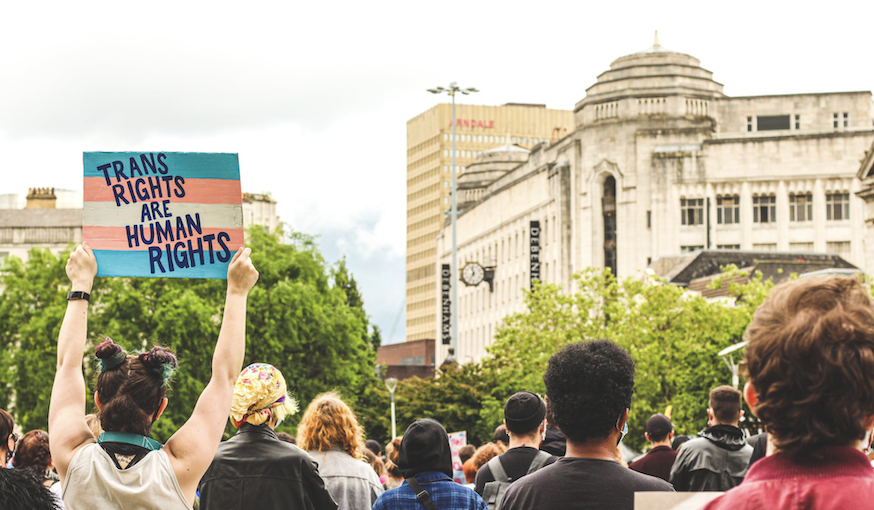
By Hunter Kessous Female genital cutting (FGC), which is the practice of removing or harming the female genitalia for non-medical reasons, is a human rights violation recognized by the UN. Right now, legislators in Texas and Idaho are looking to use pre-existing bans on FGC to block transgender youth from receiving life-saving, medically necessary gender-affirming treatments. This is a discriminatory action that has no basis in the crucial work to end FGC. Gender-affirming care can include social interventions, pubertal suppression, hormone therapy, and gender-affirming surgeries. Social interventions are typically the first step; use of a new name and pronouns, wearing different clothing, and engaging in new activities are often a part of this process. Pubertal suppression is a method of delaying puberty, and hormonal therapy causes secondary sex characteristic development that aligns with one’s gender. Both are reversible and associated with better mental health outcomes for transgender youth. Gender-affirming surgeries, such as mastectomies and vaginoplasty, are irreversible treatments performed on older adolescents who have shown a consistent gender identity and have stable mental health and parental support. Research has shown that these treatments lead to decreased rates of depression, improvement in psychosocial functioning, and minimal long-term side effects. Transgender and nonbinary adolescents experience anxiety, depression, and suicidal ideation at higher rates than cisgender people. According to a report from The National Center for Transgender Equality, 40% of transgender people in the U.S. had attempted suicide at some point in their lives, which is nearly nine times the nationwide suicide rate. Gender-affirming care can significantly improve this mental health crisis. Governor Greg Abbott of Texas was most definitely mistaken when he said “any type of genital mutilation is child abuse” regarding gender-affirming surgery; it is not mutilation, and denial of this care could be more accurately called a form of child abuse by failing to treat serious mental health needs. Texas has attempted to pass several laws that ban transgender youth from access to puberty blockers, hormone therapy, and surgery. Just last year, two of these bills died in session. These failed attempts have led legislatures to turn to FGC laws as a way of making gender-affirming surgery illegal for transgender kids. Idaho is taking discriminatory actions similar to Texas. Earlier this month, a bill that would amend the state’s existing law on FGC to ban hormone therapy, puberty blockers, and sex reassignment surgeries cleared a House committee. The amendment would also make it a felony for doctors to provide these services, placing physicians in the tragic position of needing to risk their medical license if they want to provide life-saving care to transgender adolescents. The senate opposes this bill, so, fortunately, it is unlikely to pass. Disappointingly, their reasons for opposing the bill are neither because they see the necessity of gender-affirming care nor because they disagree with conflating this care with FGC. Rather, they do not see the bill as necessary, as many Idaho physicians are unwilling to provide gender-affirming care anyway, and fear the bill undermines the parents’ authority to make decisions for their children. Texas’s and Idaho’s legislators justify their actions with claims that these medical interventions are similar to FGC in that they are both unnecessary. Yet, gender-affirming care has medical benefits (e.g. improving mental health), while FGC does not. In fact, FGC often leads to harmful psychological outcomes, including PTSD, anxiety, and depression. Another faulty comparison drawn between FGC and gender-affirming care is that they are both irreversible. It is true that FGC has irreversible physical and psychological harms, but this is not the case for all treatments for transgender youth. Again, health professionals consider pubertal suppression and hormone therapy to be reversible. Gender surgery is permanent, but research has shown that regrets about having this procedure are very rare. The benefits of gender-affirming care (improved psychosocial functioning and autonomy over one’s gender identity) paired with the high risk of withholding treatment (worsened mental health outcomes, suicidal ideation and use of non-prescription hormones) support the importance of providing this care. Lastly, medical care for transgender people is their choice as part of their right to bodily autonomy, whereas FGC violates a girl’s right to bodily autonomy. Minors are often forced to undergo FGC and are too young to fully understand what is occurring and give their consent. Furthermore, consent cannot be given when there is coercion. FGC often exists as a result of societal pressure placed on girls who are told FGC is necessary for them to be a woman, to be a member of their own culture and society, and to be married. Consent can not be freely given to undergo FGC, because coercion will always be a dangerous factor. It is harmful and incorrect to conflate FGC with gender-affirming care. I want to make clear that FGC survivors and transgender and non-binary people are not mutually exclusive communities. People who have undergone FGC and do not identify as a cisgender woman in particular would be harmed by legislation that defines gender-affirming treatments as FGC. To learn more about the nuanced experiences of non-cisgender survivors of FGC, I recommend Dena Igusti’s article on being a non-binary survivor and Dear Massi’s advice column for a transgender man who underwent FGC as a child.
DC’s “Female Genital Mutilation Prohibition Act of 2021”
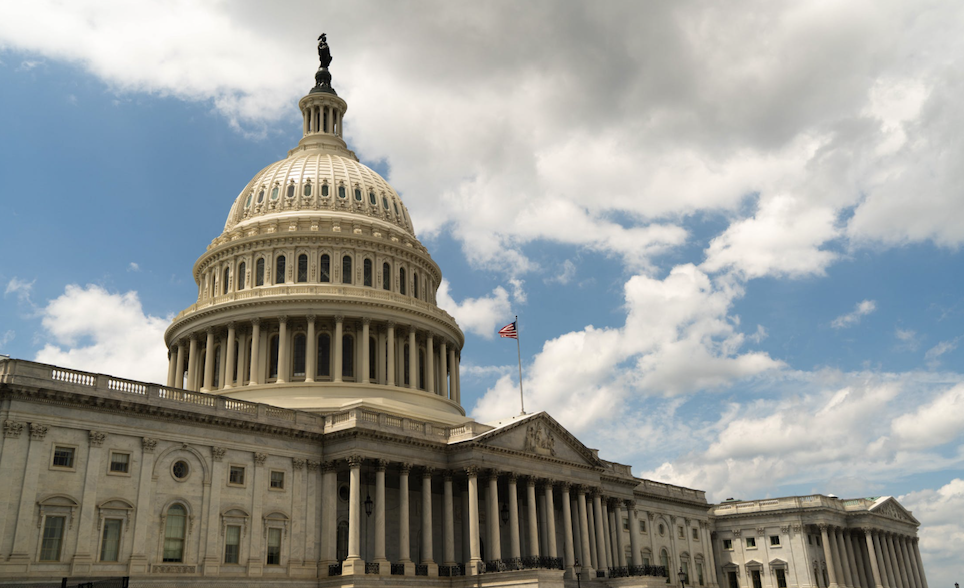
On February 28th, Councilmember Charles Allen, Chairperson of the Committee on the Judiciary and Public Safety, convened a public hearing to consider Washington DC District Bill 24-0516, the “Female Genital Mutilation Prohibition Act of 2021.” The stated purpose of the “Female Genital Mutilation Prohibition Act of 2021” is to prohibit the female genital mutilation/cutting (FGM/C) of a person under care, to expand mandated reporting requirements to include FGM/C, and to provide for a civil action for FGM/C. As the hearing was conducting virtually, advocates working to end FGM/C across the country joined in to provide expert testimony on the topic. To learn more about the bill, visit here. To keep up to date with tracking of the bill, visit here.
Who? A Zine About The Global Impact of FGC

By: Cate Cox In the fall of my junior year at university, I decided to take a course called “Human Rights and Global Literature.” In this class, we explored diverse kinds of literature that called into question different conceptions of human rights, including works by Yvonne Adhiambo Owuor, Tadeusz Borowski, Vaddey Ratner, Farnoosh Moshiri, and Eka Kurniawan. When the professor announced that our final project was to create a Zine that explored a human rights issue important to us, I immediately knew what I wanted to do. According to the World Health Organization, female genital cutting (FGC) is a human rights violation and a severe form of violence against women and girls. After nearly two years of working with Sahiyo, I wanted my Zine to focus on FGC. A complex human rights issue that is often forgotten about in the United States, I hoped to create a Zine that would help raise awareness about FGC in America, and highlight the global prevalence of this form of gender-based violence. I decided to title my Zine Who? to reflect the many misconceptions that affect who we think FGC occurs to. I wanted to dismiss some of the misconceptions around FGC that assert it is only practiced in certain communities and in certain places. Given that my audience would mainly be my fellow classmates, I particularly wanted to focus on the prevalence of FGC in the United States. I included statistics such as the CDC estimate of women and girls affected by FGC in the U.S., and the many legislative delays in outlawing the practice. The hardest part of creating this Zine was deciding on what images I wanted to draw to accompany my writing. While working at Sahiyo, I have become increasingly aware of the ways in which violent and graphic imagery about FGC can re-traumatize survivors and stigmatize communities. Before I began to draw, I sat down with the Sahiyo Media Guide on Reporting on FGC; this was extremely helpful for thinking through the kinds of images I could draw to represent the harm FGC causes in a way that was also ethical and respectful to survivors’ experiences. After many edits and scrapped designs exploring the harms of FGC and who it occurs to, I still wasn’t quite satisfied. I explored the many consequences of FGC, and realized that I didn’t only want my Zine to highlight the harms of FGC. I wanted to provide my audience with ways to get involved in the world to end FGC and motivate people to become involved in the issue. I decided to end my Zine with a reminder that, while it may seem difficult, ending FGC is possible if we are all involved. The process of creating this Zine was a very enlightening experience that allowed me to think through both ethical reporting on this issue, as well as how to motivate people to become involved in the crucial work to end female genital cutting. Read Who? Female Genital Cutting (FGC) around the world.
Legislative update: The Biden Administration’s National Strategy on Gender Equity and Equality
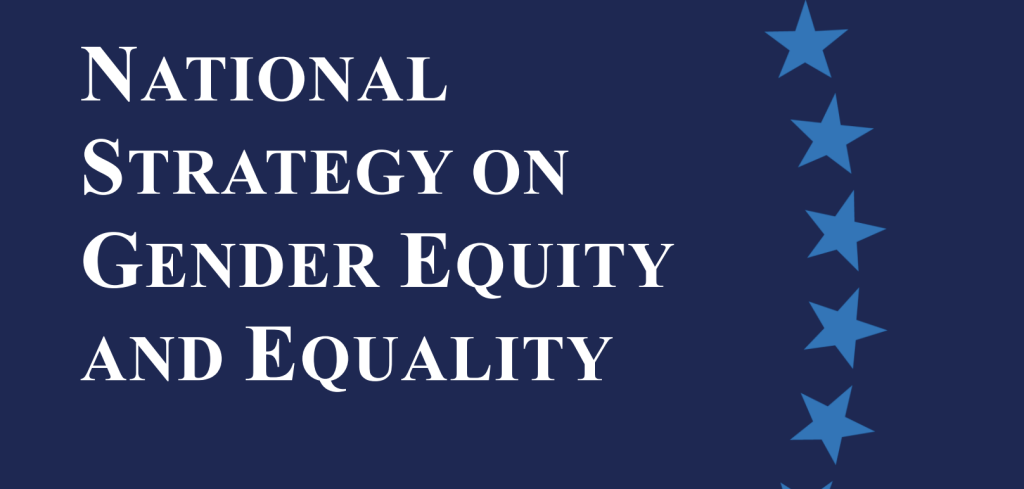
On October 22nd, the Biden-Harris Administration issued the first-ever national gender strategy to advance the full participation of all people – including women and girls – in the United States and around the world. The National Strategy on Gender Equity and Equality incorporates female genital cutting (FGC) as a form of gender-based violence needing attention, clearly labeling it a “human rights abuse” and planning several courses of action to work towards ending it. The Strategy recognizes that millions of women and girls are at risk of FGC, and that these human rights abuses occur domestically and abroad, which poses a global security issue. he Administration plans to “collaborate with state officials to prevent and address harmful practices that undermine human rights,” and “work with a broad array of leaders to promote programs that address harmful practices that undermine human rights.” Sahiyo commends the Biden-Harris Administration’s important acknowledgement of this harmful practice, and looks forward to seeing how the strategy will be implemented through collaboration with domestic and international leaders to create change.
Sahiyo’s statement on the Michigan case dismissal on Sep 28, 2021
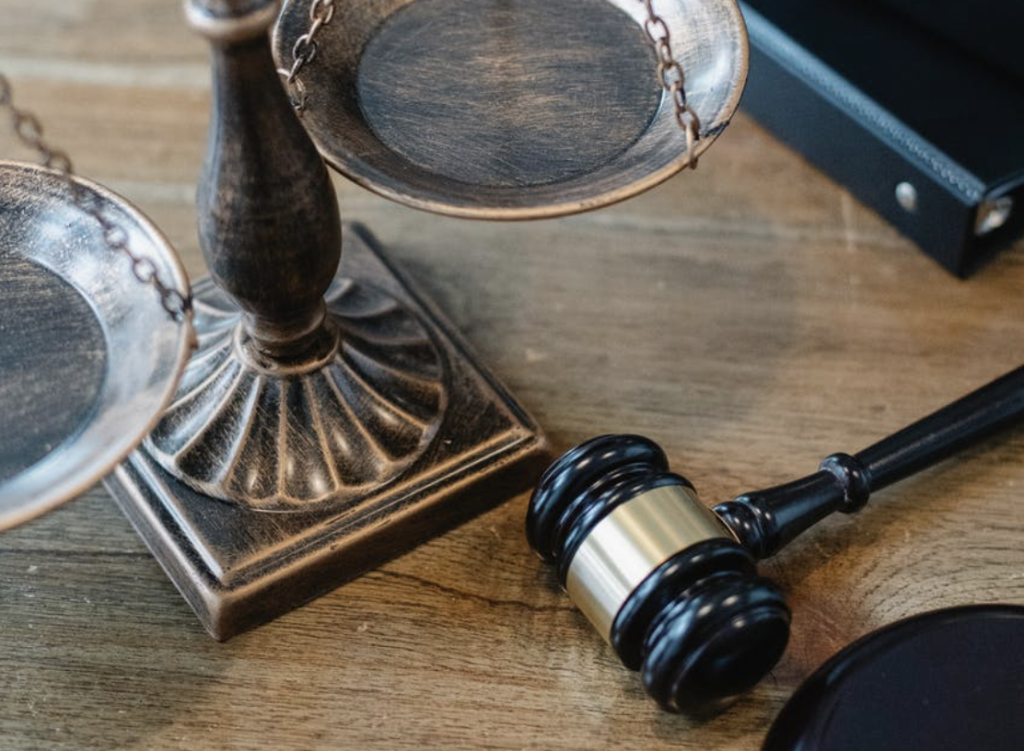
It is with great sadness and disappointment that Sahiyo responds to the recent judgement in the Michigan case. Female genital cutting (FGC) is recognized internationally, and specifically by the U.S. Government as a violation of human rights. Judge Friedman’s decision to throw out this case, which is the nation’s first FGC case, highlights a failure to protect girls in the United States from this harmful practice, and a failure to truly understand the extent and pervasiveness of FGC within this country. (See the Amicus Brief, which is informed by survivors of the same community as the girls in this case, and provides details on these aspects of FGC for the judge). This judgment has been met by much criticism already, with a call from The US End FGM/C Network for more training across all branches of government, including judicial training that includes: what FGM/C is, how it is carried out, and its life-long impact on women and girls. Sahiyo believes we cannot allow harmful practices such as FGC to continue. Girls’ rights cannot go unprotected due to legal technicalities and decisions made by those who do not, or refuse to, understand the realities of gender-based violence. We must all work together to protect ALL girls from this harm and we call on the Department of Justice to appeal this decision. Background on the case On April 13, 2017, Detroit emergency room doctor Jumana Nargarwala was arrested and charged with performing FGC on minor girls in the United States. This was the first time someone was brought up on charges under 18 U.S.C. 116, which criminalizes FGC. According to the U.S. Federal complaint, Dr. Nagarwala performed FGC on 6 to 8 year old girls out of a medical office in Livonia, Michigan. Some of these girls’ families reportedly traveled inter-state to have the doctor perform FGC. On November 20, 2018, Judge Bernard Friedman ruled that the US Federal Law banning Female Genital Cutting was unconstitutional based on a technicality. With this ruling, the judge dismissed key charges of FGC against two Michigan doctors and six other people accused of practicing genital cutting on several minor girls. The ruling was determined by Judge Friedman’s stance that the crime of FGC should be regulated by individual states. However, the US does not actually have laws against FGC in every single state. At the time, only 27 out of 50 states had a state law banning FGC. As of October 2021, there are now 40 states with a state law. There is a state law in Michigan banning FGC, but the law only came into effect in 2017 after the federal case involving Dr. Nagarwala and Dr. Attar came to light. The doctors cannot be prosecuted retrospectively under this Michigan state law. After Judge Friedman’s verdict in 2018, the Department of Justice failed to appeal Judge Friedman’s decisions in 2019. As a result, Congress filed a motion to appeal the decision, but the motion was denied. In 2020, these events led Congress to unanimously amend and strengthen the Federal FGC law, in order to withstand future challenges, while firmly stating its disagreement with Judge Freidman’s interpretation of the law. In January of 2021, Congress passed the H.R. 6100-STOP FGM Act. (((To learn more about the history of this court case and legislation in the U.S., read CoP Law & FGM – Legislation in North America.) However, the combination of Judge Friedman’s recent decision in September 2021 dismissing the remaining charges against Doctor Nargarwala (and calling the prosecution ‘vindictive’ for seeking new charges), with the Department of Justice’s original decision in 2019 to not appeal his decision, underscores how protecting girls from violence was not central to the case.
Mutilation or enhancement: A researcher’s argument for respectful terminology on genital cutting

By Brian D. Earp I have published several papers on the ethics of medically unnecessary genital cutting practices affecting children of all sexes and genders. When my writing touches on the sub-set of these practices that affect persons with characteristically female sex-typed genitals, I have received some pushback for using the term female genital cutting (FGC) rather than female genital mutilation (FGM). An instance of such pushback came from a respected colleague in response to a paper of mine in Archives of Sexual Behavior, in which I argue against the use of ‘mutilation’ in certain contexts, as there is evidence that such stigmatizing language may have adverse effects on the very people who are meant to be helped. Given that this terminological issue is likely to keep coming up, I thought I would share parts of the reply I wrote to my colleague. I hope it can shed some light on at least one plausible way of thinking about such matters. My colleague argued that my use of ‘FGC’ rather than ‘FGM’ is disrespectful because it goes against the recommendation of the 2005 Bamako Declaration adopted by the Inter-African Committee (IAC) on Traditional Practices Affecting the Health of Women and Children. ——— On the matter of disrespect. I have had many conversations with women who consider themselves circumcised, rather than mutilated, and even if they agree that medically unnecessary genital cutting should not be performed on persons who are incapable of consenting, primarily children, they insist that it is harmful, stigmatizing, and paternalistic for others to simply define their own modified genitals as mutilated (a term that implies disfigurement or even an intent to cause harm). They explain that their loving parents, however misguided, did not intend to cause them net harm, just as, for example, Jewish parents who authorize that their sons be circumcised do not intend to harm them, but rather, take an action that is sincerely believed to appropriately integrate the child into an ancestral community. They recognize that, in their own communities, both male and female genital cutting practices are widely seen as improving the genitalia, including aesthetically, which is contrary to the very notion of mutilation. I may not agree with that interpretation myself, but it is not my position to tell these women (or their brothers) that their altered genitals are ugly or disfigured rather than, as they see it, aesthetically (or in some cases, culturally or religiously) improved. I will ask: Were these leaders democratically elected to express the considered opinions of their constituents, or were these leaders self-appointed? At the very least, they cannot have been authorized to speak on behalf of countless Southeast Asian or Middle Eastern women who have been affected by ritual forms of female genital cutting. In any event, I face a choice. I can disagree with the conclusion of these African leaders who seem to feel qualified to speak on behalf of millions of other women, including non-African women, and impose an entirely negative and stigmatizing interpretation of all of their altered genitalia regardless of how those women see their own bodies. Or I can show respect to those women who have shared their stories with me, as well as all the women in various reports and testimonies who have expressed strong objections to the term ‘mutilation’ being forced on them, and who would simply like to have the room to be able to evaluate and describe their own genitals as they see fit. One woman explained her feelings: “In my opinion, the word ‘mutilation’ used in reference to [what happened to me] is a degrading and disempowering term that strips women of their dignity and self-worth. Basically, it is a label that has the power to negatively influence one’s self-identity. If you understand labelling theory you will understand how damaging/influential a term or classification can be to an individual.” She continued with her experience: “Having just about survived my ordeal of forced body alteration I was very aware of the violation to my body. However, the introduction of the term ‘mutilation’ into my consciousness affected me mentally and physically. It made me view myself as an ugly, mutilated, and frowned-upon member of society. There started my journey of self-hate, which presented itself in many forms, including bulimia and social anxiety, to name but a few. To be called the ‘mutilated’ girl by health professionals stripped me of any dignity and covered me in shame on numerous occasions. Thankfully, I no longer see myself as a victim or survivor of ‘FGM’ – I refuse to allow that term to take away my power or to define who I am.” Faced with the choice between respectfully disagreeing with the analysis and conclusion of a group of leaders whose qualification to speak on behalf of others I do not know, versus showing respect to those women, such as the one quoted above, who have asked for the right to determine their own victim status (including whether they regard their genitals as mutilated or otherwise), I choose the latter. Referring to “the event” and “the torture” is using singular language to refer to a plurality of quite different events carried out in different ways by different groups for different reasons. As you know, the World Health Organization (WHO) uses the term FGM to refer to a dozen or more practices, ranging from nicking of the clitoral hood, which does not remove tissue. In many communities, for example in Malaysia, it’s often done by a doctor with sterile equipment and pain control, through to excision of the external clitoris with a rusty implement and no pain control followed by infibulation, as occurs in some rural parts of Northeast Africa, for example. It is entirely accurate to say that all of those quite different interventions are medically unnecessary acts of genital cutting; and I argue that all of them are morally impermissible if carried out on a non-consenting person. I have written about labiaplasty, a common procedure in Western countries. I
A reflection on Sahiyo’s virtual U.S. Activists Retreat

By Anonymous The aim of Sahiyo’s third annual Activists Retreat in the United States was to continue to work toward building a network of U.S.-based Bohra activists against female genital mutilation/cutting (FGM/C) by strengthening relationships with one another, sharing best practices, and providing tools for activists to utilize in their advocacy work moving forward. Below, a participant shares their experience from the virtual Activists Retreat. Why did you want to attend the virtual retreat? The main reason was because I had attended the in-person retreat in 2019. I made it a goal to keep attending. In 2020, I was planning on going to the in-person one. I wanted to participate. I have a personal experience with FGM/C. It was kind of a big deal that I attended in 2019 and it was quite eye opening. There was a lot about the issue I didn’t really know or understand and going was quite an experience in a good way, in a positive way, and I just wanted more. It was definitely something I want to continue to learn about. Apart from my own experience, I don’t know much about it as far as facts and figures are concerned, tangible facts. It was very helpful. It was interesting to understand. It was an emotional rollercoaster. There’s so much more to do and learn. What have you learned or most enjoyed at the virtual retreat? The biggest thing I enjoyed was seeing all these new people. I was proud to see so many more people join this. I had an idea that a lot more people were going to join. But seeing so many people attend and engage was really nice. It was really cool to see people not let the virtual aspect of it simmer everything down. Newer people were still engaging and wanting to learn more about it. Men joined this time, and it was cool to see them engage and ask questions and try to understand. It’s never something that people talk about within our own age group. How and why are you involved in the movement to end FGC? To be totally honest, I am still trying to figure out the how part. Maybe it’s part of my personality. I get very overwhelmed by so many things. Just the fact that I attended the retreat and I’m so glad I did—going there was a huge step for me, in general. As much as I enjoyed it, I was able to participate in something I hadn’t before. Toward the end, I felt like I could do a little bit more. I attended the retreat with friends and there was more confidence to participate in something like the retreat because we had a level of comfort. And we all agree that a group like Sahiyo is doing good work. How do you think this virtual retreat will inform your work as an individual and/or activist? It definitely showed us that it’s a lot easier to connect with more people this way. One thing I noted after the in-person one—I know that they had calls after the in-person retreat. Attending this virtual retreat, you definitely don’t have an excuse to not interact or reach out to people who attended. In that sense, it was encouraging to see that people were in completely different parts of the country and we could attend. We’d never met before and interacted in person. I wish that we had more time. Action planning was really informative. What work are you doing currently or hoping to do in the future? I think the most immediate thing that I feel like I could do, and I had offered to participate in that part as well. We have physicians in our family and I know 100 percent that they would advocate against FGM and we were trying to figure out how to put together a network of physicians and informing or coming up with informational texts to [explain] what happens with your body. Most people I know who have undergone it, just plain and simple [don’t know] the effects of it. My reaching out to some of the physicians of our family to help out with that is an immediate goal. I know some people that are my age. We’ve briefly spoken on the subject and I would really like them to join the next retreat. These couple of things are things I could actually do something about. Have you attended a Sahiyo retreat in the past, and, if so, what was it like to attend this virtual activist retreat in comparison to the in-person retreat? The virtual retreat went a lot better than I expected. It’s so easy to mute yourself and turn your video off versus to participate. There was way more participation than I expected and good conversations. I still think the in-person one made me feel like you are part of this community. There was a sentiment there that everyone was sharing and the organizers, the way they set it up—it wasn’t super formal. People were comfortable and friendly. Just the experience of it was very comforting and safe; and I think that made a really big difference overall for the weekend. They did this over the virtual retreat, too, and they did what they could, and that was very well appreciated. To learn more about the 2021 Activists Retreat, take a look at our Report.
